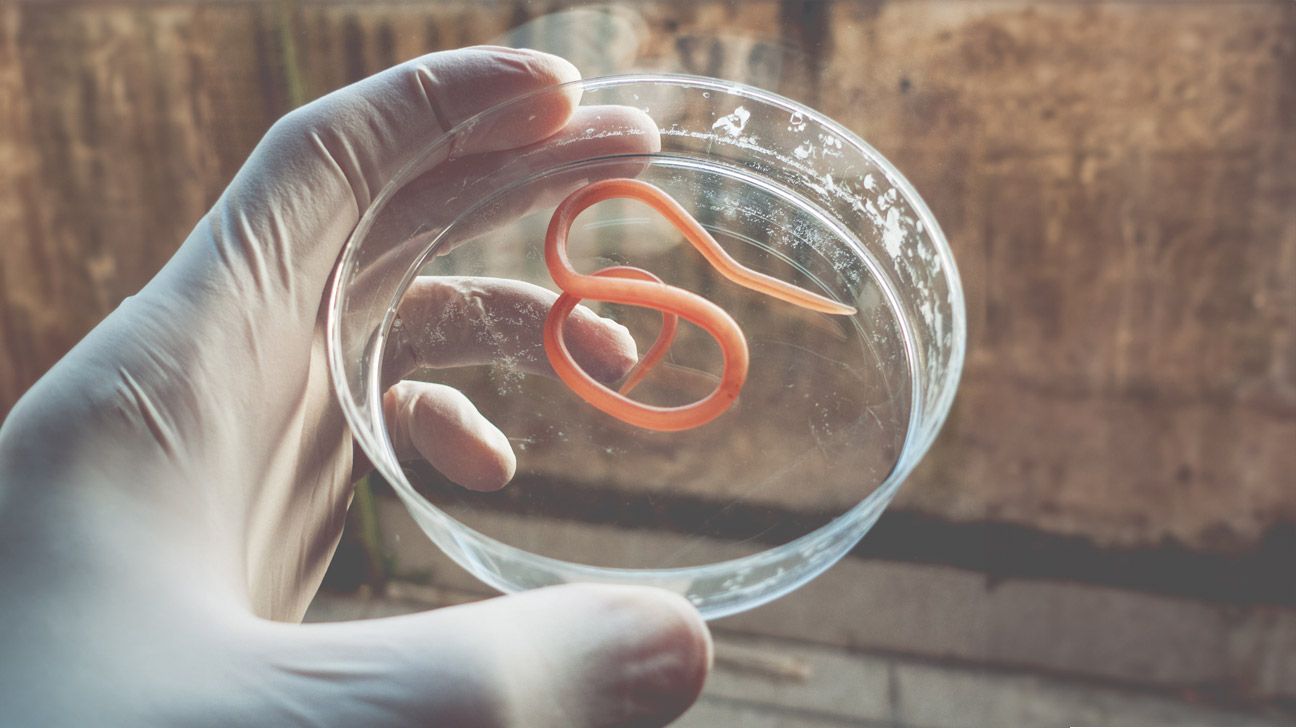Helminths are small parasitic animals, like hookworms, that infect humans. Some people purposely infect themselves to manage the symptoms of chronic illness. Helminthic therapy is being studied for Crohn’s disease.

Helminths are transmitted through infected feces that contaminate soil. There are three types of soil-transmitted helminths:
- Ascaris (Ascaris lumbricoides)
- whipworm (Trichuris trichiura)
- hookworm (Anclostoma duodenale or Necator americanus)
According to the Centers for Disease Control and Prevention (CDC), around the world at any given time:
- Ascaris infects about
772 to 892 million people - hookworms infect
406 to 480 million people - whipworms infect
429 to 508 million people
These infections are almost exclusively found in countries with low hygiene and sanitation access.
Helminths are transmitted from animals to humans through contact with infected feces. The ways that this may happen include:
- drinking contaminated water
- walking barefoot on contaminated soil
- not washing hands with soap and water after handling pets or using the bathroom
- eating fruits and vegetables that have not been carefully cooked, washed, or peeled
Once inside the body, helminths thrive inside the small intestine.
Symptoms may include:
- blood loss
- diarrhea
- abdominal pain
- nutritional deficiencies
Prescription medication can clear infections.
A helminthic infection may seem like something to try to avoid. However, some people purposely infect themselves to manage the symptoms of chronic illness. This is called helminthic therapy.
Helminthic therapy involves intentionally contracting a helminth infection with hookworms or whipworms. This therapy is used to treat:
Helminths are thought to help treat these diseases by inhibiting the body’s immune response, which in turn reduces inflammation.
To begin the treatment, you receive an injection of the worm’s eggs or drink several doses of a liquid containing the worm’s eggs. Your doctor monitors your condition closely so that you don’t get sick over the course of treatment.
Over time, the worms may cause dangerous side effects, such as an increased risk of anemia.
A protein deficiency may also develop, leading to difficulty in thinking ability and stunting physical growth in some people.
Medications are available to offset these side effects. For example, your doctor may prescribe iron supplements for anemia.
Studies in mice and rats suggest that helminth infections are able to inhibit the immune response.
A
Additional research is needed to clearly establish the safety and effectiveness of this treatment.
One major problem for people looking for helminthic treatment is that they will often have to travel outside of the United States to receive it.
Currently, only one clinic in Mexico provides hookworm treatment for Crohn’s disease. However, as more research is done, the availability of helminthic therapy may increase.
It’s unsafe to treat yourself by ordering hookworm or other helminth eggs over the internet. There are many potentially dangerous side effects.
If you do decide to travel for helminthic therapy, only undergo treatment under a doctor’s guidance.
The Food and Drug Administration (FDA) has not approved helminth therapy. The FDA has granted Investigational New Drug status to several species of worms, including pig whipworm (Trichuris suis) and human hookworm (Necator americanus).
This means that U.S. researchers are allowed to test the worms in human study participants. There has been a special interest in the pig whipworm because it can’t live inside the human gut for very long. This might make it a safer option for humans.
